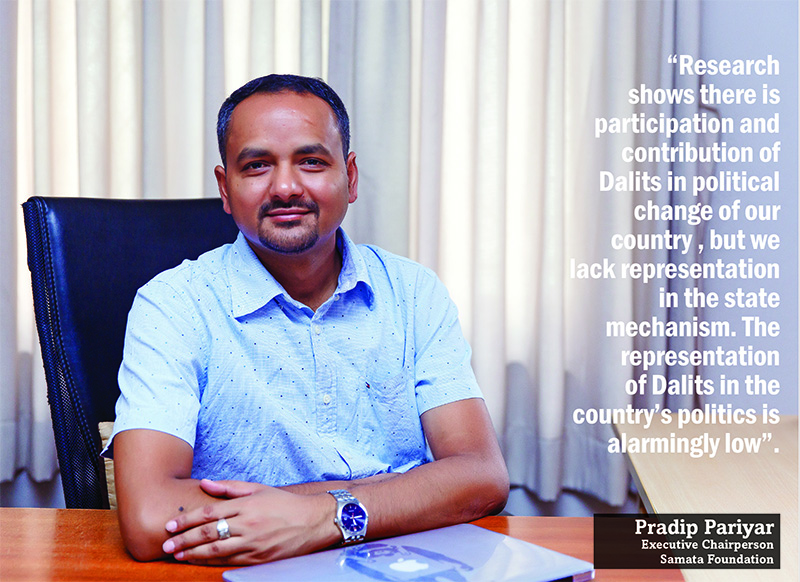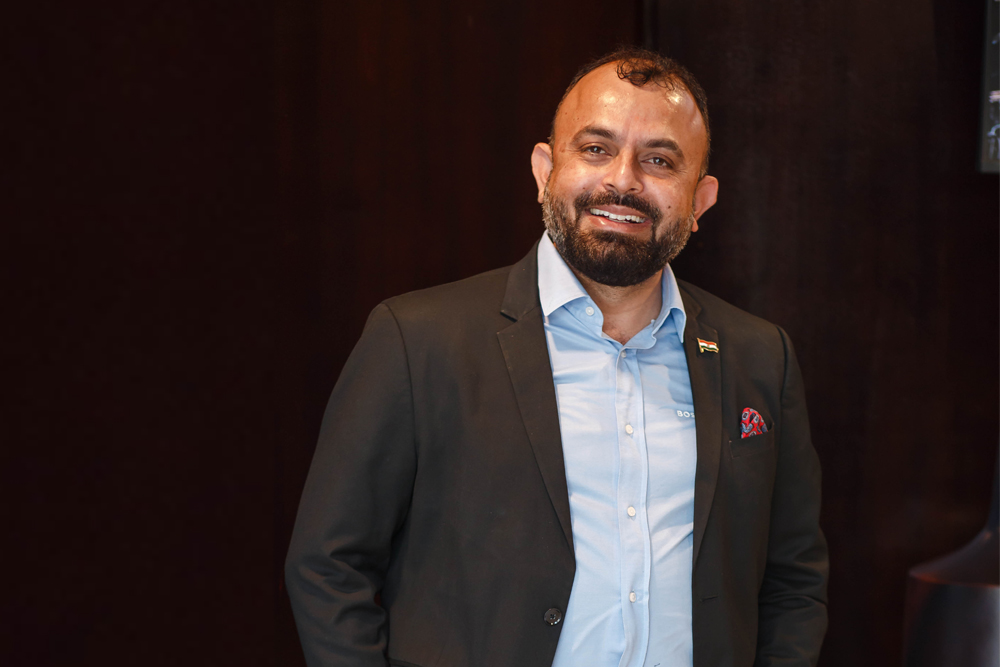
Pradip Pariyar is the Executive Chairperson of Samata Foundation established in 2009. Pariyar has been associated with the foundation for the past two years. Samata Foundation is one of the NGOs which played a huge role in the inclusion of Article 24 and 40 in the Constitution. The Articles talk about the rights of Dalit in the country.
Before joining Samata, he used to run the largest youth network in the country for nearly 15 years. This platform gave him an opportunity to work not only with the youth of Nepal but Myanmar and Somalia as well. He was one of the high-level task force members of Nepal Government’s Youth and Sports Ministry to make the National Youth Policy and Vision 2025 for the country.
Coming from the same community, Pariyar always wanted to work for the upliftment of Dalits. When the opportunity arose, he took it immediately. In a detailed conversation with Ankita Jain of B360, he talks about the current status of the marginalised community in the country, the practice of discrimination and more.
What are the new domains Samata Foundation is working towards?
We strive to create a just society, free from all forms of caste-based discrimination through research, publication, knowledge dissemination and evidence-based, informed policy advocacy. Similarly, we work on policy reform based on the figures obtained through research. Currently, our major focus is on the implementation of basic amenities promised by the government to the marginalised: land, housing, health, dignified job, etc.
With more than 50 books published, we are in talking terms with Kathmandu University to include our books as reference material. So far our books are referred in Tribhuvan University for the Master in Sociology and MPhil programs. We aim to develop the Samata Resource Centre as one of the major resource centres leading to the Dalit Knowledge Bank in the future. The other field we are working towards is human rights and justice. We have deployed Human Right Defenders in different parts of the country. They report human right violation cases to us and we initiate fact-finding missions in the particular region. We make public the facts obtained and involve the Human Right Commission, Dalit Commission and others if required. Further, we are working towards creating awareness among young leaders about Dalit issues.
According to your latest research, what is the status of Dalits in the country?
We recently conducted a research on the representation of Dalits in politics in the country. Research shows there is participation and contribution of Dalits in political change of our country but we lack representation in the state mechanism. For instance, out of 296 municipalities, there is only one Dalit representative in the rural municipality. Talking about municipality Mayors, there are hardly four/five Dalit candidates. Also, the cabinets in seven provinces do not have a single representation. The only state cabinet has one Dalit minister. Moreover, the research shows the representation of Dalits in the country’s politics is alarmingly low.
The Dalit candidates elected are also not treated well. People from the same party try to create obstacles even if what candidate is doing is for good. This shows that the mindset of people is still dominated by traditional beliefs. Because of this, inclusive policies are lacking.
Further, Dalits constitute of 26 sub-castes. We are publishing a different book for every sub-caste respectively which will update their current status in the country. One is already out while two are in process and the rest will come out gradually. We are also documenting Dalit Andolans.
Nepal has been declared free from caste-based discrimination and untouchability; what is lacking in the implementation?
The announcement was made in 2011 but still the practice is largely deep-rooted. There are many incidents reported on a daily basis. The incident of Ajit Mizar is still fresh. Ajit was a victim of untouchability two years ago and was brutally killed. His body still lies in T.U Teaching Hospital. Laxmi Kumar Pariyar is another victim who raised her voice against corruption and got killed as she belonged to the Dalit community. The cases are aplenty. Though caste-based violence is punishable, it is still on the rise. Later, the government provided Rs 10 lakhs to a few of these families.

How do forums like Asian Dalit Right Forum and Asia Parliamentarian’s Forum on Dalit Concerns help in advocacy?
We have extended our advocacy and lobbying actions at regional and international levels. The regional level campaigning and lobbying are done through Asian Dalit Right Forum. We are one of the initiators of ADRF and Asia Parliamentarian’s Forum on Dalit Concerns. ADRF brings together all the organisations working for marginalised communities in Asia. Currently, the forum is working towards the involvement of marginalised communities in budget formation. Among Asian countries, violence related to caste prevails in Nepal, India, Bangladesh, Pakistan, Sri Lanka, Malaysia and Japan.
APFDC brings together Asian parliamentarians to discuss the challenges and opportunities for the Dalit community. Addressing the current Dalit issues, APFDC conference will be conducted in September in the capital.
International agencies are accused of promoting religious conversion among Dalits. Is this true?
I don’t think they force conversion. International organisations are working to address poverty, marginalisation, women’s rights, and health, sanitation and nutrition issues among Dalit communities. This is because they fare poorly in the human development index. They are poor and illiterate and lack civic, political and religious rights subjecting them to exploitation. Thus it is natural that international agencies focus on Dalits.
The problem of Dalits is much more severe in the country than in India and other South Asian countries. Though the caste system originated in India, the intensity of caste discrimination is much higher in our country. There has not been a meaningful social movement against untouchability here. They are the victims of bonded labour and poverty.
Is caste-based discrimination changing now?
Earlier Dalits were not allowed to enter certain temples, enroll children in schools, attend certain festivals, walk on the same road as a member of higher caste, court or even look at a woman of a higher caste. Today the problem is when a cleaner wants her children to have a better life. No matter their education, intellect or even financial well-being, the people of a higher caste and an older generation don’t want to let go of a system that gives them power over others. Though there are rights now but these people are denied dignity on a larger scale. In a recent case in Butwal, it was a Dalit’s daughter wedding reception where people from the higher caste also attended the wedding. They blessed the daughter but refused to eat anything. We haven’t been able to let go entirely of the discriminations even among the educated section.



.jpg)


